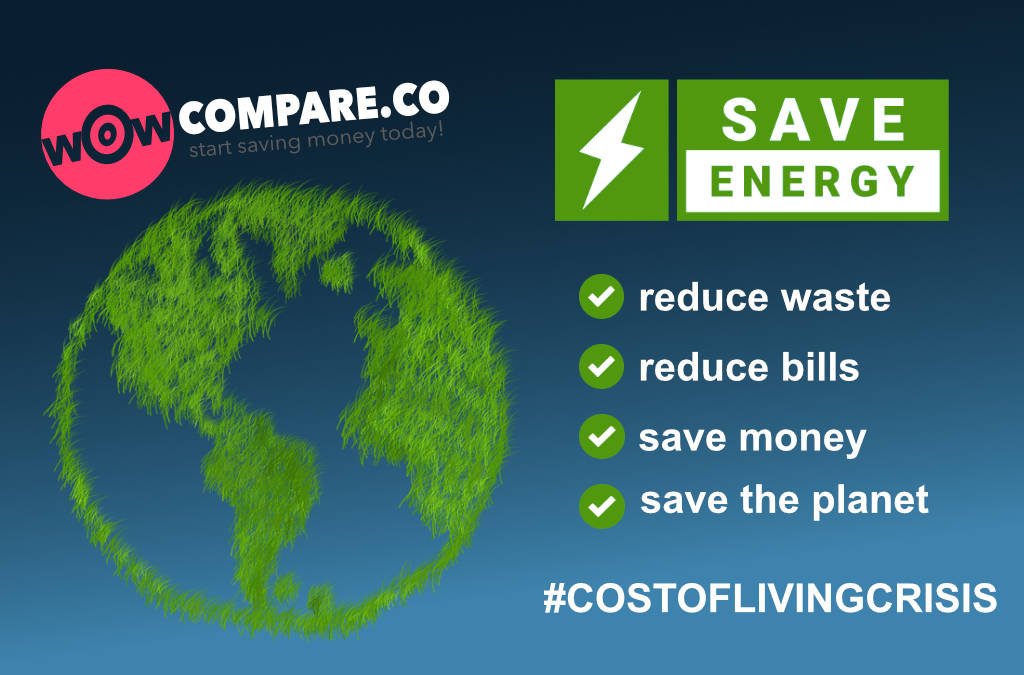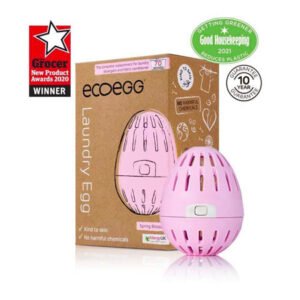WOW Compare energy saving guide reduce energy use, lower bills and save money.

Top 5 Energy Saving Tips
Follow these tips, for quick and easy ways to save energy and money. Reducing your household energy use also helps to reduce your carbon footprint so it’s a win win.
Best ways to lower household energy bills
Some of the best ways to reduce your electricity and gas bills are as straight forward as turning a dial or flicking a switch, providing instant savings.
① Replace old windows & doors with double or triple glazing
The initial outlay for window and door replacement is costly, however installing new energy efficient windows and doors can reduce draughts and prevent heat leaking from your home. Preventing heat loss can save serious amounts of money during cold winter months.
Window replacement is costly and may not be affordable for low income households, so check with your local authority to see if they offer any schemes or grants to help cover the cost of window and door replacement.
Local authority home improvement grants are often non-repayable, however access to funding is dependent on individual circumstances and a successful application. You will usually need to provide proof of your household income.
② Install more insulation in loft space, insulate cavity walls, insulate hot water cylinders
Good insulation is key to reducing heating costs, all but the best insulated homes suffer from heat loss. Here’s how you can better insulate your home:
- Install new or more efficient loft insulation, you can even add an extra layer of insulation to drastically reduce heat loss and reduce the cost of heating your home.
- Install insulation to internal or exterior walls, or get your cavity walls professionally insulated. Wall insulation helps keep your home warm in the winter and cooler in the summer.
- Install an insulating jacket around your hot water cylinder if your have an old copper cylinder, extra insulation will help your water cylinder retain heat and use less energy.
- Ensure seals around doors and windows are working, buy draft excluders for problem doors these measures will help prevent cold draughts coming in and heat leaking out.
The Energy Saving Trust estimates that an annual saving of more than £250 can be achieved by effectively insulating the average detached house in the UK.
③ Turn down central heating and water heating temperatures
If you have a digital boiler with temperature controls, you can save on gas and electricity by reducing your central heating & hot water output temperatures by just a few degrees.
- Reduce your central heating circulation temperature for instant savings, central heating for wet radiator systems works efficiently between 60-65°C, setting the boiler flow temperature any higher will make your boiler work harder and use more gas.
- Turn down your heating on your room thermostat, if you have a room thermostat set it at 19-20°C for comfortable heating. Setting the temperature higher will make your boiler cut in more often and use more gas or oil.
- Turn the heating down if it is getting too hot, don’t open windows, your heating will carry on working even when it’s not needed, wasting gas/oil and electricity.
- Reduce the hot water output temperature, if you have a combi-boiler you can easily adjust the on demand hot water temperature. Set your hot water temperature output at 45°C for better energy efficiency.
- Hot water cylinders – IMPORTANT hot water stored in a cylinder should be heated to 60°C to effectively kill legionella bacteria. But setting your hot water cylinder to heat any hotter than 60- 65°C will rapidly increase the energy consumption and cost.
④ Turn off heating when you are at work or out
Why heat your home when you are out? Ensure you are not wasting money heating an empty home:
- Program your boiler or heating system to remain off when nobody is home.
- Install a smart home thermostat, a smart thermostat provides ultimate control over your heating. Nest, Hive and other smart thermostats are simple to fit, smart thermostats allow you to login to turn your heating on, or off while you are out. You will never have to return to a cold home, at the same time you can eliminate wasted gas and electricity use by keeping heating off when you are out.
⑤ Switch to energy efficient LED light bulbs
Most light bulbs are available in LED versions. LED light bulbs can emit as much light as filament, fluorescent or halogen bulbs, but only use a fraction of the energy.
Did you know…If you replaced all 40 – 120 watt bulbs with 4 – 12 watt LED equivalents you could reduce electricity needed for lighting your home by around 85%
LED bulbs last up to 20x longer, so you can make even more savings by not having to replace light bulbs as often.

(*Amazon have a huge selection of LED Bulbs including bayonet, screw in, GU10 etc. plus smart bulbs for automated colour changing, dimming and mood lighting effects).
⑥ Reduce hot and cold water use
You can reduce water consumption by implementing some simple changes. Reducing hot water use helps decrease energy costs as most households still heat water using electricity, a gas or oil boiler, or hot water cylinder.
- Fit aerating inserts to taps and showers, tap aerators can be screwed into your existing faucet spouts or taps. For hand held showers you can switch to an aerating water-saving shower head, or fit an inline aerator. Water aerators can reduce water use by 1000’s of litres each year.
- Fit a water softener, in hard water regions a water softener helps protect boilers, water cylinders and and pipework from calcium build up. A water softener can help maintain your boiler or immersion heater and keep them running efficiently. Soft water also makes cleaning easier, you should find you need to use less shower gel, soap and cleaning products.
- Turn off the tap when brushing your teeth, if you leave the tap running while brushing you wasting water and throwing money down drain… only turn the tap on when you need to rinse.
- Switch from baths to showers, showers use much less water than a bath, that’s if you don’t spend ages in the shower!
⑦ Turn off lights when you leave a room
One of the simplest things you can do is turn off the lights when you leave a room, many households are wasting money leaving lights on unnecessarily. Get your whole family into the habit of turning lights off in empty rooms.
⑧ Turn off appliances at the wall, don’t leave appliances on standby
Leaving multiple appliances on standby overnight, every night, can result in energy costs adding up.
Over the course of the year leaving appliances on standby overnight can waste money. Items like TVs, CD and DVD players, dishwashers, washing machines, tumble dryers can all be switched off at the mains when not in use without effecting their programming.
A great way to automatically switch off appliances is to use standby savers or smart plugs & energy controls these can be set to automatically turn off appliances overnight.
⑨ Eco wash, use non-bio laundry products, wash on a short cycle at 30 degrees
New eco detergents are kinder to the environment and wash clothing at lower temperatures. Eco & plant based laundry products work as well as biological ‘enzyme based’ detergents, allowing you to wash at lower temperatures, saving you money evert wash.
Did you know…You can save up to 50% electricity by washing at 30°C on a shorter wash cycle?
- Wash clothing at 30°C, if clothing is not heavily soiled choose a shorter wash.
- Always wash a full load – washing individual items & small loads wastes water and electricity.

Get an ECOegg eliminate the need for expensive laundry detergent or powder, wash with an ECOegg. The cleaning pellets inside the egg last for up to 70 washes, for clean fresh laundry every time.
ECOeggs help to reduce plastic waste, they are chemical free, vegan & allergy friendly (* Laundry ECOeggs start at £9.99 refill pellets are from £4.99 – each refill provides up to 70 washes – use the link for 15% off your first order).
⑩ Limit tumble dryer use
Save money by drying clothes naturally, always dry clothes and bedding outside in dry weather during the spring and summer. Limit using your tumble dryer in the winter, dry clothing on an indoor airer in a conservatory, sun room or utility room if you have one.
- Finish off drying in an airing cupboard.
- Only use a tumble dryer for a short time, finish drying items that are already almost touch dry.
- Remember to clean your tumble dryer lint (fluff) filter each time before use, this will ensure your dryer works as efficiently as possible. Lint and fluff build will increase the time needed to dry clothing & bedding, and cost you more money.
⑪ Fully load your dishwasher and run on a short cycle
If you have a dishwasher, always make sure you have a full load before putting it on. Most dishwashers have a number of program cycles:
- Wash on a quick 45-50°C cycle with a premium branded dishwasher tablet for perfectly clean and sanitised kitchen utensils and cookware.
- Turn off your dishwasher at the mains or on/off button between each use.
⑫ Upgrade old inefficient appliances with ‘A’ rated appliances, or best in class appliances
It would be costly to replace all appliances at once but when old appliances break down or need replacing, try to buy the most energy efficient brands or models.
All appliances now provide energy ratings from A to G. You can check an appliances rating online on manufacturer websites or displayed by the retailer online or in store.
How much could you save?
The Energy Saving Trust estimates Households could save up to *£351 a year by implementing many of these simple solutions.
Energy consultancy Cambridge Energy provided government guidance on the best ways to for UK households to make energy savings you can see the report here Cambridge Energy Saving Report complied for BEIS.
Energy help – Are you struggling with energy bills?
If electricity & gas bills are becoming a struggle, there are several things you can do to access help. The most important step is to acknowledge your difficulty and work out a plan to try manage your bills.
Contact your energy supplier to discuss your situation
First off it’s always wise to contact your energy supplier, your supplier can look at your monthly usage and they might be able to suggest a payment plan that is more affordable. You might be able to switch energy tariff, to a tariff with better pricing based on your use & needs. If you are on fixed rate that’s ending soon your supplier will be able to advise on what options are available going forward.
Your energy account is in credit but your supplier has increased direct debits – what can you do?
If you are in credit with your supplier you can request that they re-assess your usage and bring down monthly payments inline with your average monthly use. If you are struggling with bills it is not in your interest to be paying more each month than your bill total.
A small amount of credit on your energy account/s can be helpful as it provides a buffer when bills come in higher than expected on a given month. Households generally use more electricity and gas in the winter than in the summer, so it is usual to build some credit over the summer which is offset against increased energy use during winter.
Find out if you can access an energy grant
Supplier energy grants
Some suppliers are able to offer temporary energy grants to customers who are really struggling, accessing a grant does require you to provide household financial information to check eligibility, suppliers offering grants include:
- British Gas – access to energy grants at British Gas Energy Trust
- EON Energy Fund – access to energy grants with EON Energy Fund
- EON Next Energy Fund – access to energy grants with EON Next Energy Fund
- EDF Energy Customer Support Fund – access to energy grants with EDF Energy Customer Support Fund
- Ovo Energy Fund – access to energy grants with Ovo Energy Fund
- Scottish Power Hardship Fund – access to grants through Scottish Power Hardship Fund
Local authority energy support
Some local authorities offer energy grants for certain low income households. Most grants are for improving home insulation, not financial assistance with bills. You can check if there are any grants available where you live via GOV.UK – Find energy grants for your home.
Government energy support
The government offers 2 schemes ‘winter fuel payments‘, providing annual payments of £100 – £300 for over 65s to assist with winter heating costs. In addition there are also ‘cold weather payments‘ available to more households when the weather remains cold at 0 °C, or below for 7 consecutive days or longer. You can apply for £25 for each 7 day period where the temperature does not rise above 0.
Still struggling with energy bills, these charities & organisations can help
If you are still struggling there are some charities and organisations you can contact for free, independent advice on debt, energy bills, and cost of living issues, these include:
Citizens Advice
In larger towns you can find local Citizens Advice branches, you can also access Citizens Advice by website: England and Wales or Scotland. Advisers are available online or, in person and over the phone: 0800 144 8848 (England), 0800 702 2020 (Wales), and 0800 028 1456 (Scotland).
National Debtline
National Debtline is available to discuss household and personal debt, they can be contacted on 0808 808 4000 or you can visit the National Debtline website for more information.
Step Change
Step Change is a UK charity who are there to help with debt. They can provide help answer your questions on debt. Plus they are able to provide assistance with Debt Management Plans, IVAs, DROs and other courses of action: Call 0800 138 1111 or visit Step Change website.
Search for cheaper energy
Energy providers have started to introduce cheaper electricity & gas tariffs. Our energy price comparison service now has 100’s of deals from UK energy suppliers, see if you can find cheaper electricity & cheaper gas here.
Don’t forget to sign up to the WOW Compare newsletter for amazing offers, deals and prize giveaways.
Help friends and family save energy and reduce bills – share this page!
ADVERTISEMENT
















